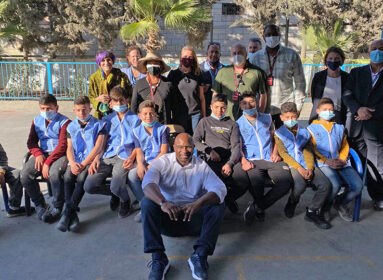Special to the Ledger
WEST HARTFORD – Marci Alter got a call last fall from Rabbi Ilana Garber of Beth El Temple, where she has been a member for 14 years. Rabbi Garber explained she was launching a new initiative for a small group of women in the congregation that would take them on a shared Jewish journey through study, ritual and social action. Alter is already highly involved in synagogue life, particularly through her leadership in social action; nonetheless, she was intrigued at the prospect and said yes. “I wanted to strengthen my Jewishness,” she said.
Now well into the nine-month program, called Chai Mitzvah, Alter says she has been enriched by the experience of learning with a diverse group of women, and is more thoughtful about how Jewish teaching can inform her daily life. As part of her Chai Mitzvah commitment, she chose to undertake an independent study of Mussar with Rabbi Jim Rosen, and “it became the most powerful piece of the program” for her. Mussar is a spiritual discipline that guides Jewish ethical behavior.
“It has opened my eyes,” said Alter. “You realize you need to work on things. I am learning to try to find the good in everything, to be generous, not to speak behind someone’s back, to be patient, and to learn humility.”
For her ritual piece of Chai Mitzvah, she started lighting Shabbat candles for the first time, something she had always wanted to do. Already a volunteer “cuddler” of babies in a neo-natal intensive care unit, she decided to add gestures of thanks to the medical staff to fulfill the program’s social action commitment.
As for Garber, she has been inspired by her first Chai Mitzvah experience, calling it “transformational,” and she hopes to start several new groups for Beth El women in the fall. “We’re very excited about this,” said Garber, with her characteristic enthusiasm, at a recent information session for prospective participants. “The impetus is to try to enrich your experience at Beth El, and Beth El through your experience,” she said to the gathering. “We want happy and engaged Jews whose Judaism is constantly growing. And we want to strengthen our community.”
“It’s a great opportunity to come together and learn, and to recommit yourself,” Garber continued. The curriculum, she noted, features topics that are accessible and wide-ranging, from relationships to the obligations one has to her community. “My favorites, though, are mindfulness and gratitude,” she said. “We look at how Judaism and mindful living make us more aware of the blessings in our lives. How does it give our lives more meaning?” With all of the topics, she added, “we ask, ‘what does the Torah instruct us to do with that? What do I do with that?’”
What makes Chai Mitzvah different from some other adult education offerings is that it extends beyond the monthly classroom meetings into the home and the community, emphasized Audrey Lichter, the national program’s co-founder and executive director. “It really calls for a more holistic kind of engagement. Chai Mitzvah asks participants not only to learn and study, but to make commitments to ‘do Jewish.’ They practice tikkun olam by taking on social action projects and they adopt a new Jewish ritual to enrich their Jewish lives.”
At Beth El, Rabbi Garber holds individual meetings to help guide all Chai Mitzvah members in their choice of commitments they will make to social action and ritual, as well as independent study. “I’ll sit with you and sort out what would be fulfilling. If you want to learn it, we’ll find a way,” she told the group.
“Chai Mitzvah is meant to help individuals, men and women – with all levels of knowledge and practice – create their own Jewish meaning and identity through shared Jewish learning and experience,” Lichter said. “In the process, they and we create a deeper sense of community. At a time when the Pew study tells us more Jews are feeling less Jewish, this is a program with real potential to re-energize Jewish life.”
Founded in 2009, Chai Mitzvah has grown rapidly and now is up and running in synagogues, schools, JCCs and affinity groups. Already more than 1,000 people have participated in more than 50 cities and 60 congregations in North America, while Chai Mitzvah also operates at 14 sites in Israel and most recently has begun in Costa Rica. The program’s popularity speaks to the needs of the Jewish community, Lichter said. “And it is affordable and accessible,” she adds. At Beth El the cost is $36.
Chai Mitzvah is not a newcomer to West Hartford. Two years ago, the Jewish Federation of Greater Hartford offered it to a group of Lions of Judah, women who donate at the highest levels to Federation’s annual campaign.
Rabbi Sheryl Katzman had never taught adult education before but jumped at the opportunity when she was approached to lead the group, and she says she learned more than she taught. “My biggest surprise was how much I learned from women at different stages in their lives who are community leaders and who opened up and shared who they were Jewishly,” she said.
Like Garber, Katzman helped each woman arrive at her goals for the program, “which helped me tailor the learning that we did.” The learning style of Chai Mitzvah, she notes, is somewhat unique. “It is not about showing up at a class, hearing a lecture and going home. It’s about investing yourself. The questions and the curriculum push people to go a little bit out of their comfort zone. The whole enterprise is contingent upon people really putting themselves out there and building the learning that’s happening. The way we engage in text gives people a voice and makes them feel more competent in Jewish learning.”
As important as the classroom study was for Katzman, the “incredibly powerful aspect of the program” was that it does not stop at once-a-month meetings. “It starts with a commitment statement at the beginning of class, when participants say, ‘I’m going to make changes in my life.’ Some decided to say the Sh’ma each night or the motzi before every meal. It’s a commitment of time, heart and mind.”
For Ayelet Chozick, who lives in West Hartford, the invitation to join the Lions’ Chai Mitzvah group “came just at the right time.” She was an empty nester who realized that throughout the years, she had been driven in her Jewish choices and practice for the sake of developing her children’s Jewish identity. “All of a sudden I didn’t have kids to do things for and I remembered that Judaism is for me, too. I realized I wanted to explore new aspects of Judaism for myself.”
Chozick said there was something “very empowering” in the act of women studying together. On top of that, by virtue of being Lions of Judah, “the women were like-minded, all committed to a strong Jewish community,” making for an especially strong connection and depth of trust.
That connection, along with Katzman and the program structure, combined to form a powerful experience “of learning, rather than being taught,” Chozick said. “I’ve done other study groups. This was very different. It was much more collaborative, where each of us was encouraged to find our own meaning in the text and to share it.”
The group was so energized by the program they wanted to extend it beyond the Chai Mitzvah curriculum, with Katzman continuing to teach it. “They said they felt like they had just started and they didn’t want to stop, so we brainstormed new topics and continued,” said Katzman.
For information on forming a Chai Mitzvah group in your congregation, school, board or among your friends, contact info@chaimitzvah.org or visit www.chaimitzvah.org.








 Southern New England Jewish Ledger
Southern New England Jewish Ledger









